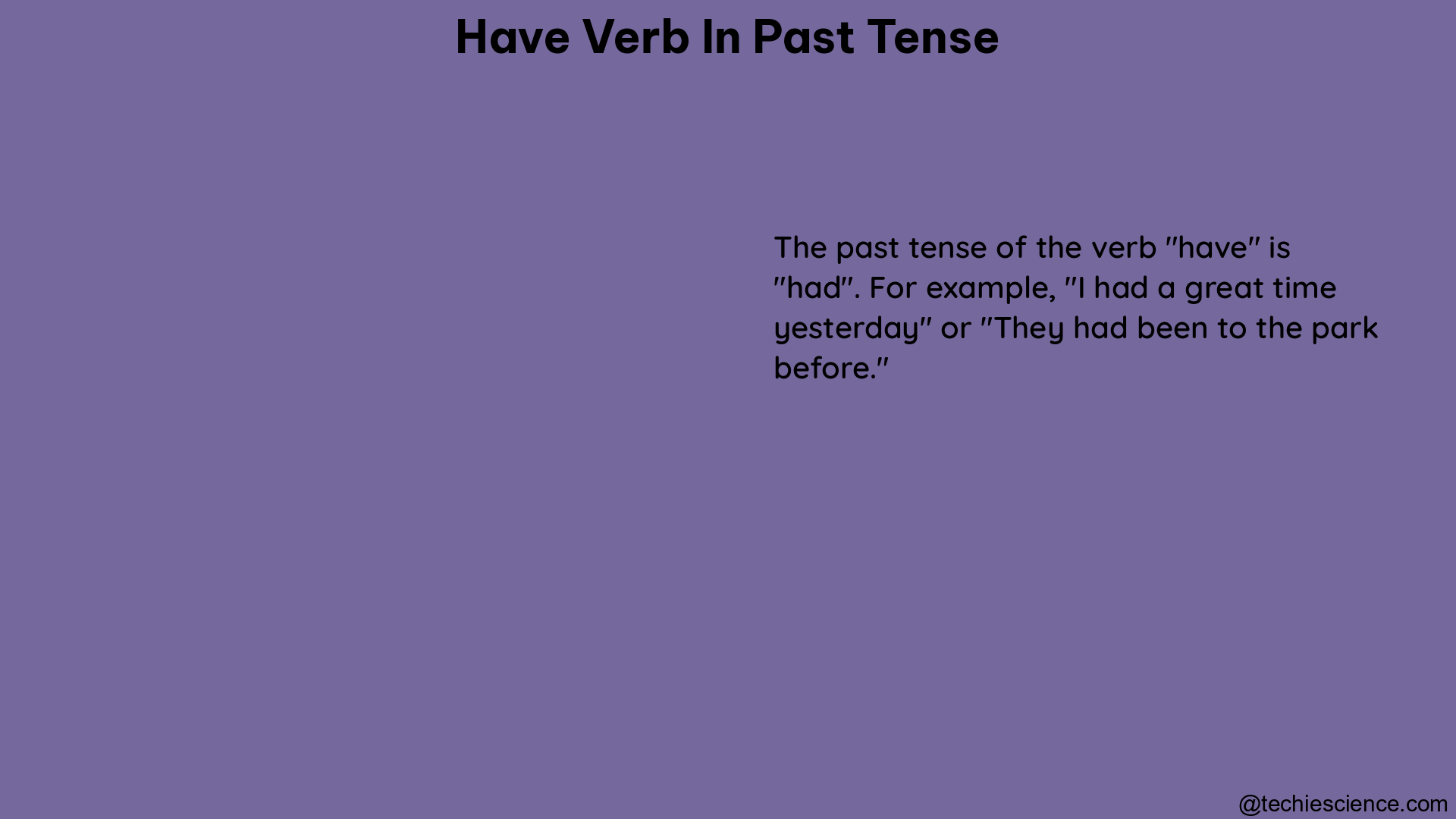The verb “have” is a versatile and essential part of the English language, and understanding its usage in the past tense is crucial for effective communication. In this comprehensive guide, we will delve into the grammatical specifications, conjugation, examples, and key points surrounding the past tense of the verb “have.”
Grammatical Specification
The verb “have” has the following grammatical specifications:
- Base Form: have
- Past Tense: had
- Past Participle: had
Conjugation

The conjugation of the verb “have” in the past tense is as follows:
Present Tense:
– I have
– You have
– He/She/It has
– We have
– They have
Past Tense:
– I had
– You had
– He/She/It had
– We had
– They had
Examples
The past tense of the verb “have” can be used in various contexts, including the present perfect and past perfect tenses, as well as the simple past tense.
Present Perfect
The present perfect tense is used to describe an action that started in the past and continues to the present.
- I have gone to the store. (The action of going to the store started in the past and continues to the present.)
- She has worked here for three years. (The action of working here started in the past and continues to the present.)
Past Perfect
The past perfect tense is used to describe an action that occurred in the past before another past action.
- I had eaten dinner before I went to the movie. (The action of eating dinner occurred before the action of going to the movie.)
- They had never seen that movie before. (The action of not seeing the movie occurred before the present time.)
Simple Past
The simple past tense is used to describe an action that occurred in the past.
- I had a book. (The action of having a book occurred in the past.)
- She had a dog. (The action of having a dog occurred in the past.)
Key Points
- The past tense of the verb “have” is “had.”
- The past participle of the verb “have” is also “had.”
- The verb “have” can be used as both a main verb and an auxiliary verb.
- As a main verb, “have” is used to describe possession or states.
- As an auxiliary verb, “have” is used to form the present perfect and past perfect tenses.
Advanced Grammatical Considerations
Negation and Interrogation
The past tense of the verb “have” can be negated and used in interrogative sentences as well.
Negation:
– I did not have a book.
– She had not worked here before.
Interrogation:
– Did you have a book?
– Had they seen that movie before?
Irregular Verbs with “Have”
Some verbs that use “have” as an auxiliary verb can have irregular past participles.
- I have done my homework. (past participle: done)
- She has been to the park. (past participle: been)
- They had seen the movie before. (past participle: seen)
Contractions
The past tense of “have” can be contracted in both formal and informal speech.
- I’d (I had) eaten dinner before the movie.
- She’d (She had) never seen that movie before.
- They’ve (They have) had a dog for years.
Conclusion
The verb “have” in the past tense is a crucial component of the English language, and understanding its usage is essential for effective communication. By mastering the grammatical specifications, conjugation, examples, and key points covered in this comprehensive guide, you can confidently and accurately use the past tense of the verb “have” in your written and spoken English.
Reference:
- https://conjugator.reverso.net/conjugation-english-verb-have.html
- https://prowritingaid.com/grammar/1000143/What-forms-should-you-use-after-have-
- https://grammar.collinsdictionary.com/us/easy-learning/how-do-you-use-the-verb-have-in-english
Hi… I am Sowndharya Jagadeeswaran, a university rank holder in M.A. English Literature. I have also done my master’s in Business Administration. Inquisitive as I am, my interest in action-oriented research helped me publish research papers in reputed journals. Now, as a career, I am an instructor where I teach young and adorable students the intricate technicalities of Public Speaking and Creative Writing. I also enjoy writing articles on topics I specialize and research in.
You can connect with me through LinkedIn.-